 Petzlover
Petzlover Catahoula Cur is originated from United States but Lakeland Terrier is originated from United Kingdom. Catahoula Cur may grow 33 cm / 13 inches higher than Lakeland Terrier. Catahoula Cur may weigh 40 kg / 89 pounds more than Lakeland Terrier. Both Catahoula Cur and Lakeland Terrier has almost same life span. Catahoula Cur may have more litter size than Lakeland Terrier. Catahoula Cur requires Low Maintenance. But Lakeland Terrier requires Moderate Maintenance
Catahoula Cur is originated from United States but Lakeland Terrier is originated from United Kingdom. Catahoula Cur may grow 33 cm / 13 inches higher than Lakeland Terrier. Catahoula Cur may weigh 40 kg / 89 pounds more than Lakeland Terrier. Both Catahoula Cur and Lakeland Terrier has almost same life span. Catahoula Cur may have more litter size than Lakeland Terrier. Catahoula Cur requires Low Maintenance. But Lakeland Terrier requires Moderate Maintenance
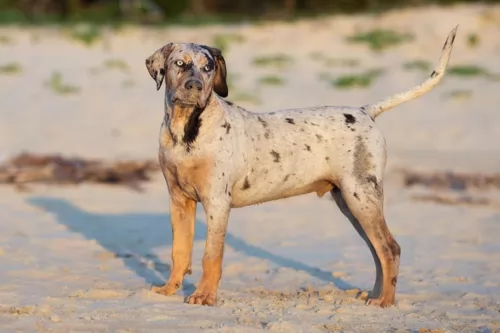 The Catahoula Cur is also known as the Catahoula Leopard Dog or the Louisiana Catahoula. The dog hails from Louisiana, United States.
The Catahoula Cur is also known as the Catahoula Leopard Dog or the Louisiana Catahoula. The dog hails from Louisiana, United States.
It is thought that the Catahoula Cur or Catahoula Hound as it is also known, used to be a hunting dog. The first settlers in Louisiana needed a strong dog to help them with hunting wild hogs and they bred their dogs with other dogs belonging to the locals. This gave them a strong, resilient dog that could take on the wild hogs and also protect their livestock.
Dogs who have no doubt been brought into the mix to produce the Catahoula Cur are mastiffs, Beaucerons, sighthounds and wolves.They are today more commonly referred to as Catahoula Leopard Dogs.
 The Lakeland Terrier hails from the lake district of England. They were bred to hunt foxes that were coming after the lambs during lambing season.
The Lakeland Terrier hails from the lake district of England. They were bred to hunt foxes that were coming after the lambs during lambing season.
These dogs are connected to a number of terrier breeds such as the Bedlington-, Border-, Old English Black and Tan- as well as the Dandie Dinmont Terriers.
In 1921 the Lakeland Terrier Association was formed and the American Kennel Club registered a Lakeland in 1934.
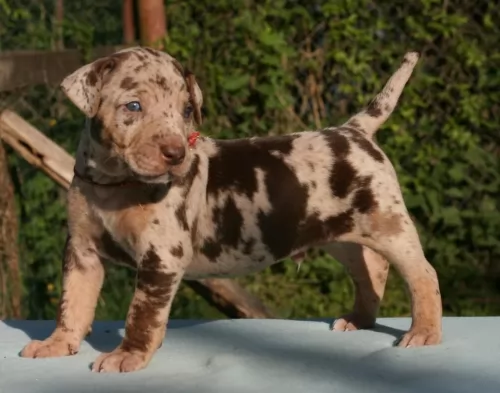 There are varying sizes for Catahoulas and a typical height is 51–66cm and weighing anything from 18 – 51kg. These Cathoula Cur’s come in different colors too, but the leopard-like coat is a dominant feature with this dog.
There are varying sizes for Catahoulas and a typical height is 51–66cm and weighing anything from 18 – 51kg. These Cathoula Cur’s come in different colors too, but the leopard-like coat is a dominant feature with this dog.
While there are solid colors, you can expect red- and blue merle, grey-, black, patchwork and brindle too.
The length of the coat varies somewhat too and while the coat is essentially short and smooth, there are Catahoulas where the coat is a little longer and more coarse.
The eyes of the Catahoula Cur are another interesting feature and both eyes can be the same color, but in some instances the one eye can be brown while the other could be blue, green or gray. The ears of the Catahoula Cur are medium in size and are floppy, dropping down close to the head.
The Catahoula Cur is an intelligent dog and also active and full of sports. You can’t call this dog aggressive, but merely assertive, being strong-willed. He is also affectionate and loyal, loving to spend time with his human family.
He makes a wonderful family pet, complete with children as well as other pets in the home, more so when he has been trained and socialized. These dogs are bright and alert and they also make excellent watch dogs. People who have owned a Catahoula Cur will tell you that these are wonderful pets, full of life and personality.
 The Lakeland Terrier is a small to medium-sized dog which stands at between 33 – 38cm at the withers and weighs between 7 – 8kg.
The Lakeland Terrier is a small to medium-sized dog which stands at between 33 – 38cm at the withers and weighs between 7 – 8kg.
The head is rectangular and he has semi-erect, semi-floppy ears and a docked tail which is held up. These days you’ll find the Lakeland being left with a long tail, taking away that attractive, square, compact look. The crisp double coat can come in a number of colors such as tan, grizzle, black and tan together, a wheatish color with some red and white. The coat is regarded as being hypoallergenic.
Possessing a number of positive attributes, Lakies, a nickname of these jaunty little dogs, is a friendly, loving, bold, self-confident dog. You’ll find that he is also determined and strong-willed but training and socialization turns him into a more obedient dog. He then gets on well with everyone in the household as well as with other pets.
They are intelligent dogs, so it won’t be difficult training him when proper training methods are used.
He is adaptable too and will adapt to life in the city or in the countryside, so long as he is exercised regularly as they are excitable, energetic dogs.
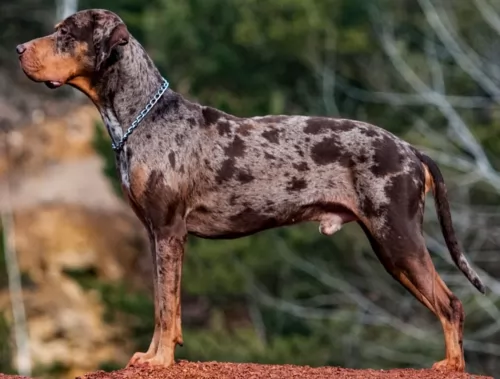 Catahoula dogs are the kind of dogs that make perfect family pets as they are all rounders. They’ve got characteristics that everybody wants in a dog. They are naturally protective, even they are not described as aggressive dogs. With training and socialization they get on well with children as well as other pets in the home. He is alert and territorial, which makes him a good watchdog, more so because he doesn’t particularly like strangers.
Catahoula dogs are the kind of dogs that make perfect family pets as they are all rounders. They’ve got characteristics that everybody wants in a dog. They are naturally protective, even they are not described as aggressive dogs. With training and socialization they get on well with children as well as other pets in the home. He is alert and territorial, which makes him a good watchdog, more so because he doesn’t particularly like strangers.
Intelligent and independent, training makes him wonderfully obedient and relaxed. However, give him the chance for ball games and a walk, and he is more than ready.
He is used to being a guard- and hunting dog, and this makes him an active, energetic dog. You will need to give him plenty of activities if you don’t want this amicable dog becoming anxious, frustrated and destructive.
Exercise him well, provide him with nourishing, top quality food together with fresh water and shower him with the love and attention he deserves as a family member. You’ll also join the ranks of Catahoula Cur owners who want to tell others about what an awesome pet he makes.
 It doesn’t matter that the Lakeland Terrier was bred to hunt and kill foxes in the Lake District of England because he is more than willing to settle down and become a loving and devoted pet too.
It doesn’t matter that the Lakeland Terrier was bred to hunt and kill foxes in the Lake District of England because he is more than willing to settle down and become a loving and devoted pet too.
He is a robust dog, known for his determination and courage. He is an energetic dog too so when you bring him into your home, be prepared to up your activity levels to cater for your energetic friend.
You can add good health to his list of positive attributes. He is a healthy dog breed with few health complaints to write about. Treat him well as every dog deserves and you can have him around for about 15, 16 or 17 years.
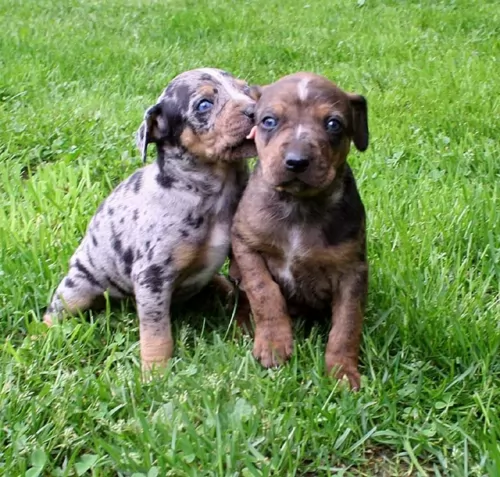 When you buy a Catahoula Cur, you can know that your pet is going to be fairly healthy, however there will be some common health issues to look out for, and by knowing about these health concerns, you can be better prepared.
When you buy a Catahoula Cur, you can know that your pet is going to be fairly healthy, however there will be some common health issues to look out for, and by knowing about these health concerns, you can be better prepared.
Your Catahoula Cur will be susceptible to some bacterial and viral infections which can be life threatening for him if he gets them. Some of these are parvo, distemper and rabies. That is why it is important to have your pet vaccinated, which can start at about 8 weeks of age for a puppy.
Obesity is a world-wide problem with humans and with their pets and it can open up a whole lot of problems with your pet’s health that he otherwise might not have got. It can play havoc with your pet’s digestion, and it can cause joint problems too.
It can be so tempting to pop a sweet treat into your pet’s mouth because you love him so much, but get to know what foods can actually be hazardous for him.
 The truth about any dog is that good nutrition, exercise and lots of love can contribute to ensuring a long, healthy life for your pet.
The truth about any dog is that good nutrition, exercise and lots of love can contribute to ensuring a long, healthy life for your pet.
Some health problems are inherited while others can be prevented simply by the kind of home you provide your pet with. Once you decide to bring a dog into your home, you need to do everything you can to ensure his wellbeing.
This is a joint problem which can see your pet limping or moving along in a skipping manner. You will need to see the vet because sometimes friction can lead to osteoarthritis, pain and lameness.
Eye problems such as cataracts and glaucoma can lead to blindness.
Terrier dogs are prone to allergies and dry, itchy skin can lead to other problems such as bacterial infections and be frustrating and stressful for your pet.
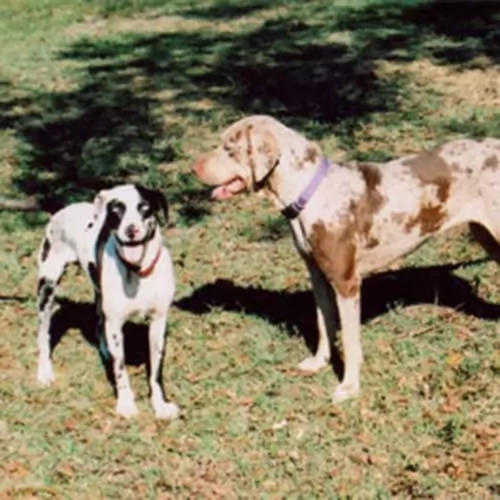 Your Catahoula Cur isn’t a high maintenance dog and a good brushing 2 times a week will keep his leopard coat looking shiny and free of loose hairs.
Your Catahoula Cur isn’t a high maintenance dog and a good brushing 2 times a week will keep his leopard coat looking shiny and free of loose hairs.
Catahoula’s have good teeth, and you want to keep them that way by brushing them at least 2 or 3 times a week to prevent dental decay and a host of other medical issues.
 Grooming doesn’t only keep your 4-legged friend in tip top shape in terms of looking well cared for, it makes him feel good too and it contributes to his wellbeing.
Grooming doesn’t only keep your 4-legged friend in tip top shape in terms of looking well cared for, it makes him feel good too and it contributes to his wellbeing.
Regular grooming also decreases the chance of health problems because you can simultaneously check him for lumps, scratches, parasites and allergies.
Stripping is a technique where you pull the dead hair out of the coat by either using your fingers or a stripping knife. This stripping makes makes room for a new coat to grow.
It is a good and effective grooming method for Terrier type dogs, and the best part about it is that if it is done correctly, the process is painless.
Other Terrier owners have a professional groomer clip the coat. In between these grooming procedures, brush your Lakie twice a week to keep the coat soft, springy and shiny.
Other grooming needs for your Lakeland include trimming his nails as needed, checking the inside of his ears for dirt and too much wax and brushing his teeth twice a week to keep tartar and bacteria at bay.
If you’re a responsible dog owner and you are unsure how to do these grooming procedures, there is no need to fret as there are always professional groomers and dental cleaning procedures that your vet will recommend. These experts can do the job professionally and painlessly for your pet.
Nothing is set in stone about what your Lakeland Terrier should eat, but it is a known fact that high quality, nutritious food wards off illness and increases longevity.
How much your adult dog eats will depend on his age and his activity levels. You want to ensure he gets the right proportions to avoid obesity too. The female Lakeland will give you 3 – 4 puppies and during this time you want to ensure she’s getting the very best, nutritious food there is – after all it’s for the sake of her puppies.
The truth about any dog is that good nutrition, exercise and lots of love can contribute to ensuring a long, healthy life for your pet. Some health problems are inherited while others can be prevented simply by the kind of home you provide your pet with.
Once you decide to bring a dog into your home, you need to do everything you can to ensure his well-being.